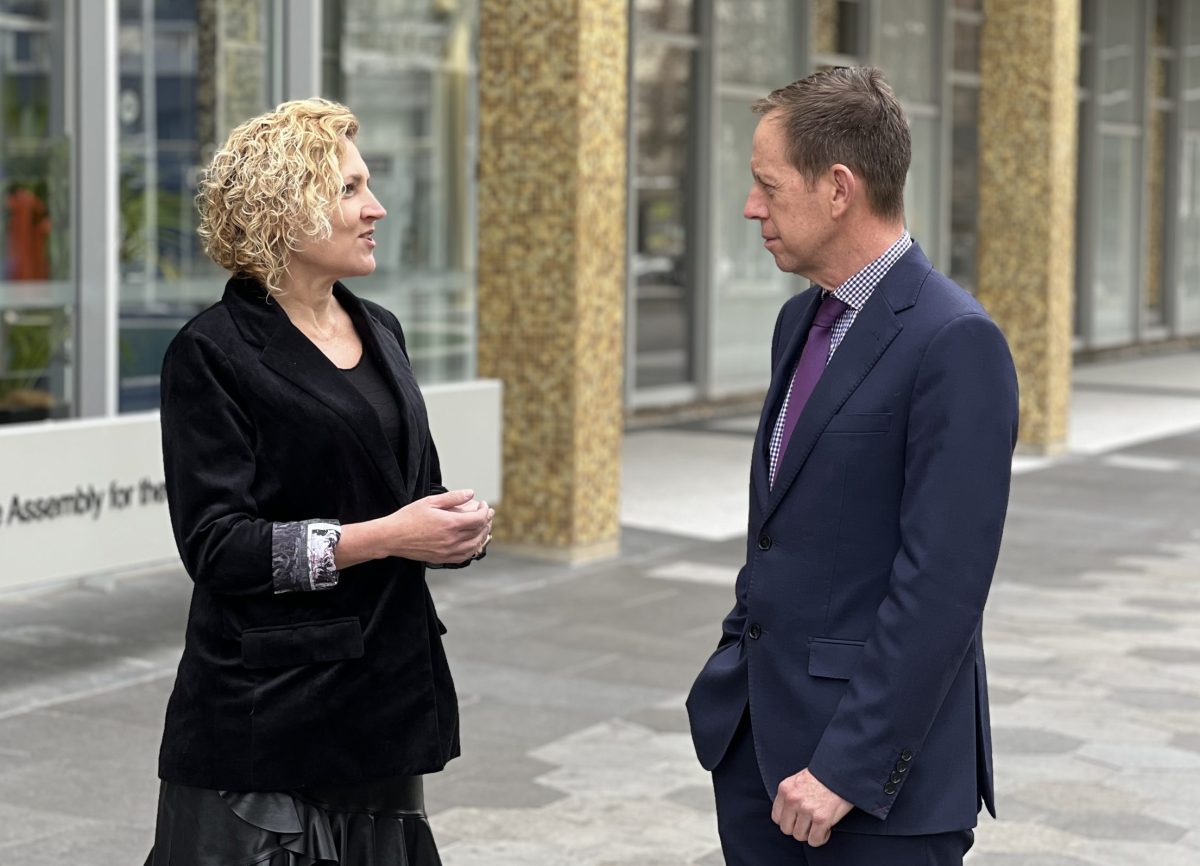
Minister for Justice Health Emma Davidson and Attorney-General Shane Rattenbury at Monday’s announcement. Photo: Supplied.
Over $210,000 will be used to extend a feasibility study into the use of electronic monitoring in the justice system as part of its most recent announcement of funding to come from the Confiscated Assets Trust (CAT).
ACT Attorney-General Shane Rattenbury said on Monday (22 July) there was a “strong opportunity” to use electronic monitoring to address gender-based violence and while the government was discussing this issue with experts, there were “mixed views” on the best way to use it.
“The government is in a heavy research phase on this at the moment,” Mr Rattenbury explained.
“There’s still work to be done to develop it. We expect to have an update for the community soon on that work.
“The key issue with electronic monitoring is deciding what area it would be applied to. Do we want to most focus on bail or on parole? These are the sort of questions that need to be resolved because in different states across Australia, it’s done in quite different ways.”
He also said the government would need to use funding from the budget for any full rollout of an electronic monitoring program.
In addition to the $214,000 for electronic monitoring, $15,000 will be used from the CAT to establish a family counselling pilot program at the Alexander Maconochie Centre.
This trial will bring a family counsellor to Canberra’s jail who can support detainees, enhance their communication skills, build resilience and provide strategies to build relationships or resolve any conflicts that may exist with their families.
“The pilot aims to foster rehabilitation, to help address systemic challenges that contribute to people’s offending, and through that to create stronger communities and break cycles of recidivism,” Mr Rattenbury said.
“This is really designed to help detainees better reintegrate with their families when they come out of custody. It can be really difficult for people to have that sense of connection, and so this program is really about giving them the skills so that when they do finish their time, they can reintegrate better.”
Minister for Corrections and Justice Health Emma Davidson said the investment will keep families better connected and support people to make safer choices once they return home.
“It’s important for us to keep in mind that when someone goes into the Alexander Maconochie Centre it’s not just that one individual who is impacted, it’s actually that whole family,” she said.
“Our support networks play an important role to keep us connected, kind and caring. For people in AMC, connection with loved ones supports their rehabilitative journey and return to the community.
“Family counselling services at the AMC will help people build stronger bonds with their loved ones that can ultimately reduce harmful behaviours, create healthier families and deliver safer communities.”
Ms Davidson said the jail’s inmates continually told the government that their relationships with their families were a key part of the work they wanted to do on themselves to change their lives.
Lastly, $50,000 of CAT funds will improve access to justice for First Nations people in Jervis Bay, over which the ACT has jurisdiction.
The funds will go to creating audio-visual link facilities at the Jervis Bay Police Station and cover travel and accommodation costs for court appearances in Canberra or transport to Jervis Bay following release from custody.
Mr Rattenbury said the AVL facilities will mean some people do not have to travel to the ACT for court, while occasionally, when someone was released from custody, they struggled to get back to Jervis Bay.
He said the CAT funding ensures that proceeds of crime recovered under the Confiscation of Criminal Assets Act 2003 can be used productively to address the impact of crime on the community.
Last week, nearly $1 million of CAT funds were announced for projects like supporting First Nations people accessing legal help, as well as supporting witnesses and complainants who go through the criminal justice system.



















